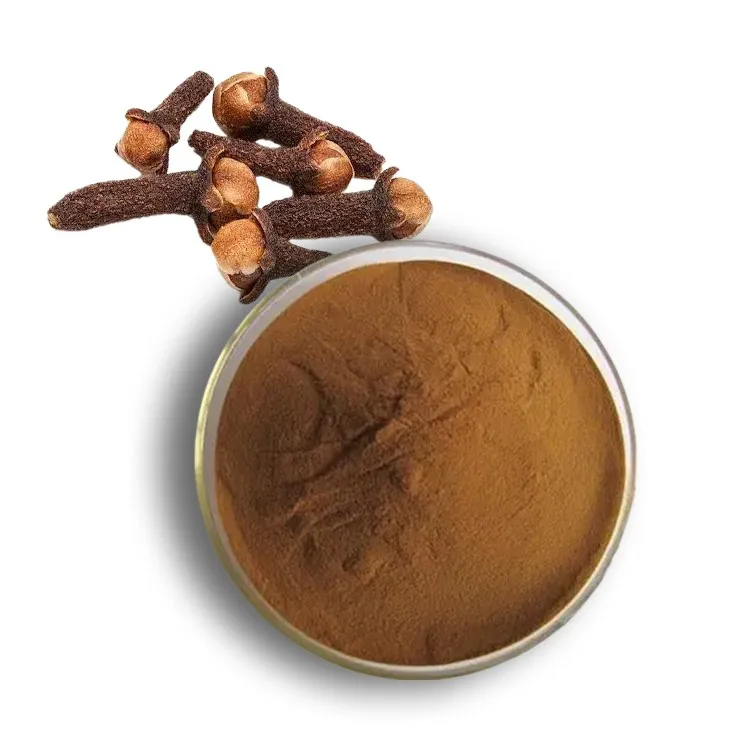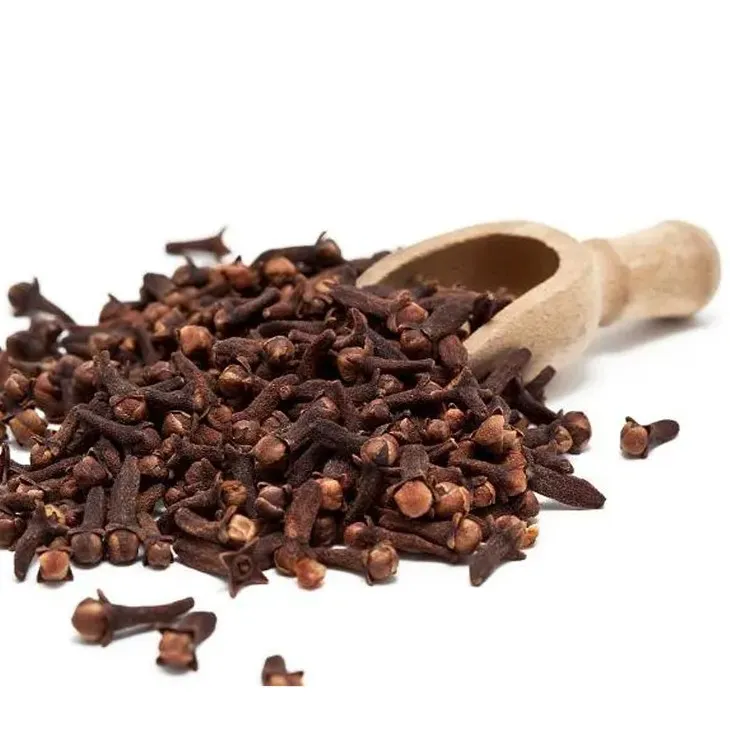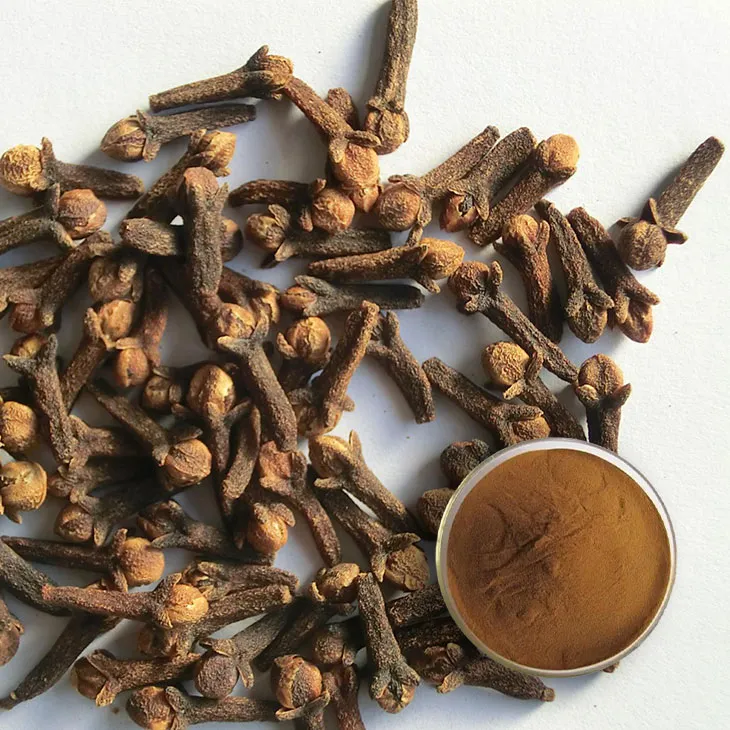- 0086-571-85302990
- sales@greenskybio.com
The best method for extracting clove powder.
2024-11-29

Introduction
Clove, a common spice with a rich and distinct flavor, has various applications in different industries such as food, cosmetics, and traditional medicine. Extracting Clove Powder is an important process to obtain its beneficial components in a concentrated form. In this article, we will explore different extraction methods, their advantages and disadvantages, and how to ensure high - quality extraction for multiple uses.

Solvent Extraction
1. Ethanol Solvent Extraction
Ethanol is one of the most commonly used solvents for extracting Clove Powder. The process typically involves the following steps:
- First, the cloves are ground into a fine powder. This increases the surface area available for extraction, allowing the solvent to better penetrate and interact with the active components within the cloves.
- The powdered cloves are then soaked in ethanol. The ratio of cloves to ethanol can vary depending on the desired concentration, but a common ratio is around 1:5 (cloves:ethanol by weight).
- The mixture is stirred continuously for a period of time, usually several hours. This helps to ensure that the active components are fully dissolved in the ethanol.
- After stirring, the mixture is filtered to separate the liquid extract from the solid residue. The liquid extract contains the dissolved components from the cloves.
Advantages:
- Ethanol is a relatively safe solvent, especially when compared to some other organic solvents. It is also miscible with water, which can be beneficial if further purification steps involving aqueous solutions are planned.
- It can effectively extract a wide range of active components from cloves, including eugenol, which is one of the main bioactive compounds in cloves and has antimicrobial, anti - inflammatory, and antioxidant properties.
Disadvantages:
- The extraction process may require a relatively long time to achieve a high yield, especially if the cloves are not ground finely enough or if the stirring is not efficient.
- There may be some residual ethanol in the final extract, which may need to be removed if the extract is to be used in applications where ethanol is not desired, such as in some food products for children or in certain religious or cultural contexts.
2. Hexane Solvent Extraction
Hexane is another solvent that can be used for extracting Clove Powder.
- The cloves are ground and then mixed with hexane. The ratio of cloves to hexane is adjusted according to the extraction requirements.
- The mixture is agitated for a certain period, typically at a controlled temperature to optimize the extraction efficiency.
- Subsequently, the mixture is filtered to obtain the hexane - based extract.
Advantages:
- Hexane has a relatively low boiling point, which makes it easier to remove from the extract during the purification process. This is important if a pure clove extract without solvent residue is desired.
- It can selectively extract certain lipid - soluble components from cloves, which may be of particular interest in some applications such as in the production of essential oils or in the cosmetic industry.
Disadvantages:
- Hexane is a highly flammable solvent, which poses a significant safety risk during the extraction process. Special safety precautions need to be taken in the extraction facility to prevent fires and explosions.
- It is a non - polar solvent, so it may not be as effective as ethanol in extracting polar components from cloves. This means that some of the bioactive compounds in cloves may not be fully extracted using hexane alone.

Supercritical Fluid Extraction (SFE)
Supercritical fluid extraction is a more advanced and relatively new method for extracting clove powder.
- Carbon dioxide (CO₂) is the most commonly used supercritical fluid in this process. The CO₂ is first brought to its supercritical state by adjusting the temperature and pressure above its critical point (31.1 °C and 73.8 bar).
- The ground cloves are then exposed to the supercritical CO₂. The supercritical fluid has properties between those of a gas and a liquid, which allows it to penetrate the cloves and selectively extract the desired components.
- By adjusting the pressure and temperature further, the solubility of different components in the supercritical CO₂ can be controlled, enabling the separation of different compounds.
- Finally, the pressure is released, and the CO₂ returns to its gaseous state, leaving behind the extracted components.
Advantages:
- Supercritical CO₂ is non - toxic, non - flammable, and environmentally friendly. This makes it a very attractive option for extracting clove powder, especially for applications in the food and pharmaceutical industries where purity and safety are of utmost importance.
- It can achieve a high degree of selectivity in extraction, allowing for the isolation of specific components from cloves with high purity. For example, it can be used to extract eugenol with a high degree of purity.
- The extraction process can be relatively fast, and the quality of the extract is often high due to the mild extraction conditions that do not cause significant degradation of the active components.
Disadvantages:
- The equipment required for supercritical fluid extraction is relatively expensive, which can be a significant barrier for small - scale producers or those with limited budgets.
- The process requires precise control of temperature and pressure, which adds complexity to the operation and may require highly trained personnel.

Steam Distillation
Steam distillation is a traditional method for extracting essential oils from cloves, which can also be used to obtain clove powder extract.
- The cloves are placed in a distillation apparatus. Steam is then passed through the cloves.
- The heat from the steam causes the volatile components in the cloves, such as eugenol, to vaporize along with the steam.
- The vapor mixture is then condensed, and the resulting liquid is collected. The liquid contains both water and the extracted components from the cloves.
- The water and the extracted components can be separated using techniques such as liquid - liquid extraction or by allowing the mixture to stand until the two phases separate.
Advantages:
- It is a relatively simple and inexpensive method, especially for small - scale extraction. It does not require the use of complex solvents or expensive equipment.
- Steam distillation can effectively extract the volatile and aromatic components from cloves, which are important for applications in the flavor and fragrance industries.
Disadvantages:
- The extraction yield may be lower compared to some other methods, especially for non - volatile components in cloves. This means that some of the potentially beneficial compounds may not be fully extracted.
- The process can be time - consuming, especially when a large amount of cloves needs to be processed.
Ensuring High - Quality Extraction
To ensure high - quality extraction of clove powder for multiple applications, several factors need to be considered:
1. Raw Material Quality
The quality of the cloves used as the starting material is crucial. High - quality cloves should be fresh, free from mold, and have a strong aroma. Cloves that have been stored for a long time or have been exposed to unfavorable conditions may have a lower content of active components and may also contain contaminants.
2. Extraction Parameters
For each extraction method, the appropriate extraction parameters need to be optimized. This includes factors such as temperature, pressure (in the case of supercritical fluid extraction), extraction time, and the ratio of raw material to solvent (in solvent extraction methods).
3. Purification and Concentration
After the initial extraction, further purification and concentration steps may be necessary. This can involve techniques such as filtration, centrifugation, and evaporation. These steps help to remove impurities, residual solvents, and water, and to increase the concentration of the desired components in the extract.
4. Quality Control and Analysis
Regular quality control and analysis are essential to ensure the consistency and quality of the extracted clove powder. Analytical techniques such as chromatography (e.g., gas chromatography for analyzing volatile components) and spectroscopy can be used to determine the composition and purity of the extract.
Conclusion
In conclusion, there are several methods available for extracting clove powder, each with its own advantages and disadvantages. Solvent extraction methods such as ethanol and hexane extraction are relatively common and can be effective, but they have some drawbacks related to safety, extraction time, and solvent residue. Supercritical fluid extraction offers high selectivity and quality but requires expensive equipment and precise control. Steam distillation is a simple and traditional method, but it may have a lower yield. To ensure high - quality extraction, attention should be paid to raw material quality, extraction parameters, purification and concentration, and quality control. Depending on the specific application and requirements, the most suitable extraction method can be chosen to obtain high - quality clove powder extract.
FAQ:
What are the main extraction methods for clove powder?
There are several common extraction methods for clove powder. One is solvent extraction, which uses solvents like ethanol to dissolve the active components in cloves and then separate them to obtain the powder. Another method is steam distillation, where steam is passed through the cloves to extract the essential oils and other components, which can be further processed into powder. Supercritical fluid extraction is also used, typically with carbon dioxide as the supercritical fluid, which can extract the desired substances effectively.
What are the advantages of solvent extraction for clove powder?
Solvent extraction has certain advantages. It can be relatively efficient in extracting a wide range of components from cloves. Ethanol, for example, is a commonly used solvent that can dissolve many of the bioactive compounds in cloves. It also allows for better control over the extraction process in terms of temperature and extraction time, which can help in obtaining a more consistent product. However, it has the drawback of requiring the removal of the solvent completely to ensure a pure clove powder product.
How does steam distillation work in extracting clove powder?
Steam distillation involves passing steam through the cloves. The heat from the steam causes the volatile components in the cloves, such as essential oils, to vaporize. These vapors are then condensed back into liquid form. This liquid contains the extracted substances from the cloves. It can then be further processed, for example, by removing excess water or other impurities to obtain a form that can be made into clove powder. This method is good for extracting volatile and aromatic components.
What are the challenges in supercritical fluid extraction of clove powder?
The main challenges in supercritical fluid extraction of clove powder include the need for specialized equipment. Since it uses supercritical carbon dioxide, the equipment must be able to handle high pressures and precise temperature control. Also, the process can be more complex compared to other extraction methods. However, it has the advantage of being a relatively clean extraction method as carbon dioxide is easily removed and leaves no toxic residues, and it can selectively extract certain components more effectively.
Which extraction method is most suitable for large - scale production of clove powder?
For large - scale production, steam distillation may be a more suitable method in many cases. It is a well - established process that can handle large quantities of cloves. It is also relatively cost - effective for extracting the main volatile and aromatic components needed for clove powder. However, solvent extraction can also be scaled up, but it may require more elaborate solvent recovery systems to be economically and environmentally viable.
Related literature
- Optimization of Clove (Syzygium aromaticum) Powder Extraction for Enhanced Bioactivity"
- "Comparative Study of Different Extraction Methods for Clove Powder and Their Impact on Quality"
- "Advanced Techniques in Clove Powder Extraction: A Review"
- ▶ Hesperidin
- ▶ Citrus Bioflavonoids
- ▶ Plant Extract
- ▶ lycopene
- ▶ Diosmin
- ▶ Grape seed extract
- ▶ Sea buckthorn Juice Powder
- ▶ Fruit Juice Powder
- ▶ Hops Extract
- ▶ Artichoke Extract
- ▶ Mushroom extract
- ▶ Astaxanthin
- ▶ Green Tea Extract
- ▶ Curcumin
- ▶ Horse Chestnut Extract
- ▶ Other Product
- ▶ Boswellia Serrata Extract
- ▶ Resveratrol
- ▶ Marigold Extract
- ▶ Grape Leaf Extract
- ▶ New Product
- ▶ Aminolevulinic acid
- ▶ Cranberry Extract
- ▶ Red Yeast Rice
- ▶ Red Wine Extract
-
Soy Extract
2024-11-29
-
Cactus Extract
2024-11-29
-
Camu Camu Extract
2024-11-29
-
Hawthorn Extract
2024-11-29
-
Astaxanthin
2024-11-29
-
Mangosteen extract powder
2024-11-29
-
Quercetin
2024-11-29
-
Curcuma Longa Extract
2024-11-29
-
Bitter Melon Extract
2024-11-29
-
Chaste Berry Extract
2024-11-29





















